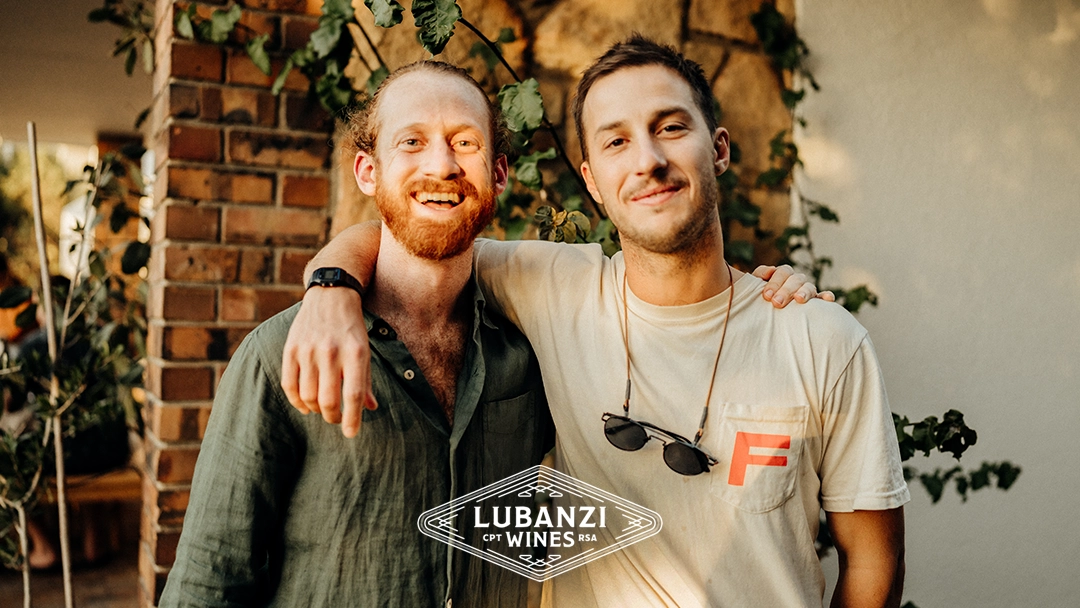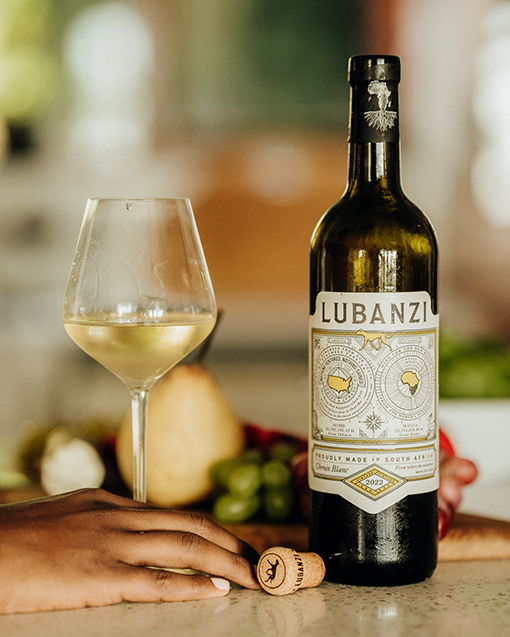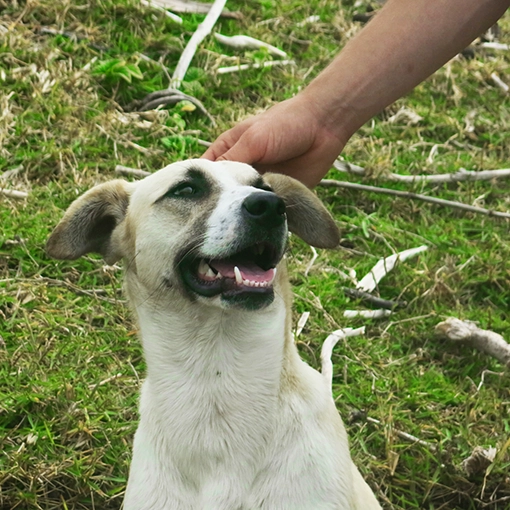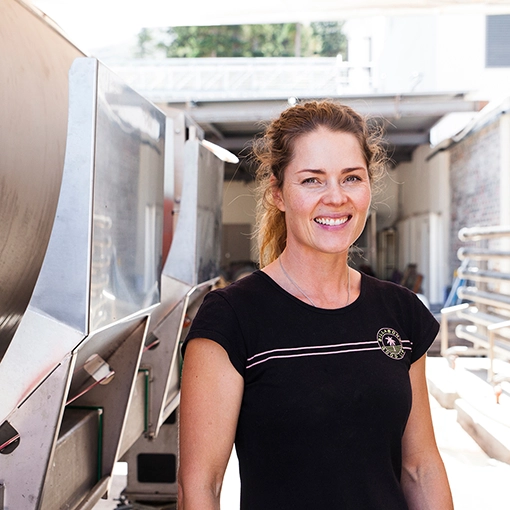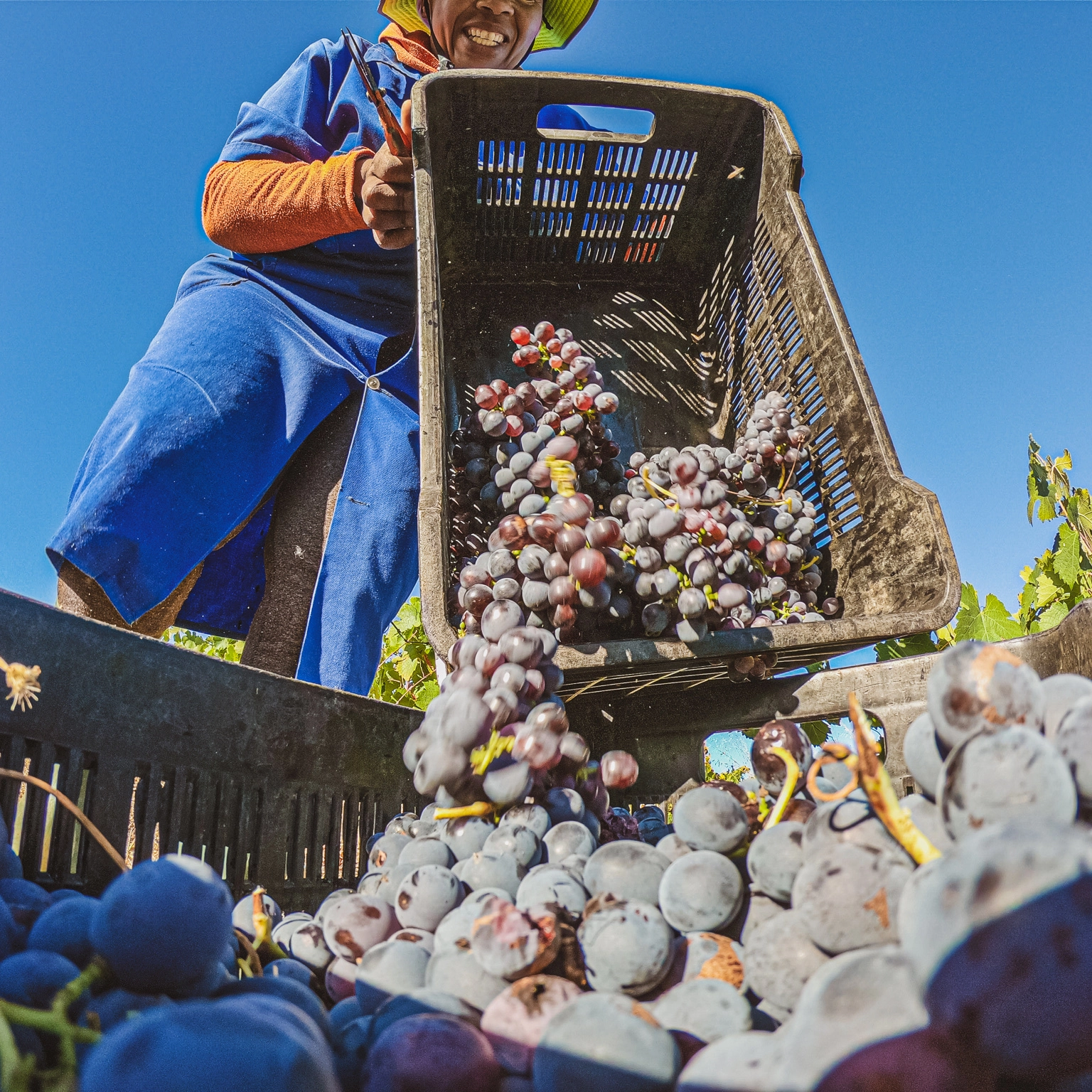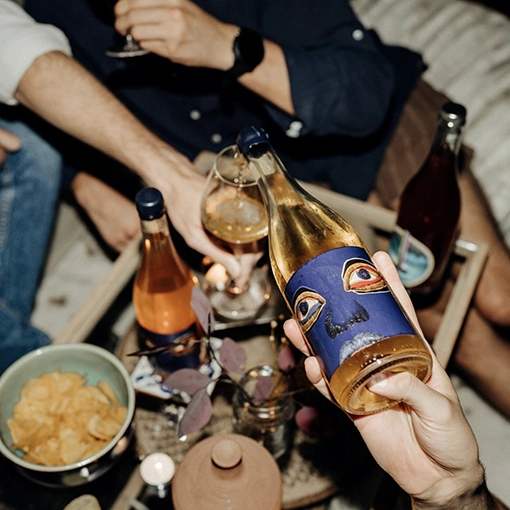In partnership with Serendipity Wines, Lubanzi is available in both Texas and California markets.
At Lubanzi, every sip tells a story of dedication to quality, environmental stewardship, and community impact. Situated in the Western Cape of South Africa, the winery embodies the youthful, energetic spirit of its adventurous co-founders Charlie Brain and Walker Brown (pictured above, respectively). After years developing a business plan that prioritizes people just as much as product, they are widely known for centralizing social good in any and every area of production— and they are proving to everyone else in the wine industry that this can be achieved without sacrificing quality of product. This month we interviewed Walker to learn more about their abundant sustainability efforts, the stories behind partnerships, and the chimerical Lubanzi pup that started it all.
Q: Did you ever expect to work in the wine business? What has surprised you most about launching Lubanzi?
A: The story of launching Lubanzi definitely starts, rather than with wine, but with a love and a passion for South Africa itself, and the people, the culture, the tapestry of the place. But it turns out wine is such an incredible proxy for that in some ways, this sort of tactile concoction of the combination of people and of place, and it became this incredible avenue to share a slice of the magnetism of South Africa as a country. You really do become fanatical about the winemaking over time – and that certainly happened to us. I’m not sure I necessarily ever expected to work in wine, but all the best things to do seem to happen by surprise.
Q: Can you tell us about the iconic Lubanzi pup— the one who joined your trek across South Africa and is referenced on your labels? Have you ever run into them again since your original backpacking trip?
A: Yeah! Lubanzi was a stray dog who, so [Charlie and I] learned, followed sets of travelers backpacking across the Wild Coast in the Transkei, on the Southeastern coast of South Africa. We ended up being one of those lucky groups of backpackers, and Lubanzi followed – or perhaps better said, led – us for 6 days on that backpacking trip. Certainly one of those memories you never forget. We’ve been back to the Wild Coast since then and never found Lubanzi himself, but we like to think he’s simply off leading another set of hikers somewhere along the way.
Q: How did you meet and partner with your winemakers, Trizanne Barnard & Bruce Jack?
A: We really spent a lot of time in those early days looking for friends and partners who wanted to be part of this thing we were trying to build, and met with so many amazing winemakers and farmers, but I think it was a pretty immediate connection with Bruce and Triz upon meeting them way back in 2016. We had reached out to ask for a meeting and I think all we’d said was we were Americans trying to start a social enterprise, and I think both of them would admit they were probably pretty shocked when we showed up and turned out to be two 22 year olds wearing t-shirts; not sure that was quite what they were expecting.
But I think the connection was absolutely there from the start, and I think both of them really bought into the mission and the energy pretty immediately, and we were sort of off to the races. These days Triz is really at the helm for us from a winemaking standpoint, and Bruce, the legend that he is, remains an incredible mentor and voice of reason for Lubanzi, now 7 years later. Among all the lucky breaks we’ve had – and there have been so many – we definitely count this meeting among the very best.
Lubanzi’s judicious approach to certifications is one of the ways they hold themselves accountable to their community. A true rarity in wine, they are Climate Neutral Certified (obtained through offsetting and reducing carbon emissions), a member of 1% For the Planet (earned by companies that donate at least 1% their of annual sales to environmental organizations), and they have a business model that circulates 50% of their profits back to local farmworkers. Beyond all of that, they are also Fair Trade Certified (emphasizing sustainable sourcing models) and one of the only B-Corp certified wineries in the world— a rigorous, multifaceted designation stressing transparency and responsible labor practices among many other legal commitments. To date, there are currently less than 25 B-Corp certified wineries across the globe.
Q: What inspired you to centralize social good and labor justice in your business?
A: I think pretty squarely we just believe in a better way of doing business, and for us I think that means taking people and the planet as really central and critical stakeholders in everything we do, and paying more homage to the importance of their place in the supply chain. But mostly it just comes from a place of a love for South Africa and wanting – and feeling a duty – to have Lubanzi be a force for real and meaningful social good in a place that we loved and felt an obligation to personally. We were so lucky to find an incredible partner in bringing that social enterprise model and vision to life in The Pebbles Project, who have been doing such incredible work in the winelands for so many years, through whom we recycle 50% of our profits, and fund health and education programs.
Q: Can you tell us a little bit about the process of becoming a B-Corp and Fair Trade certified organization? What were the challenges?
A: Both are pretty deep and detailed audit processes, B Corp especially, so you have to hold yourself accountable. We drew a line in the sand in the early days that we’d only work with grapes that had fair trade certifications, as a way to safeguard and ensure responsible supply chains that benefit people and the planet in a passive and structured way, and B Corp was this important way for us to ensure that we let a third-party hold us accountable for commitments to a standard for social and environmental responsibility… It also serves as an awesome way to discover and iterate on how we can improve and be better, and make meaningful steps every year to be a better business for the world.
Q: What has been the response from consumers? Are more people gravitating towards wines that address not just environmental sustainability, but social sustainability as well?
A: I think that’s happening, like I’m sure it is in other products too, and we feel like this is an awesome realization for folks. I do think that sometimes the wine trade/consumer/etc. – all my inexperience admitted upfront – seems to sometimes use Organic as a proxy for covering all their bases for providing a definitive thumbs up on what products are a sort of ‘positive-impact’ purchase, and tons of things in organic farming are great, obviously, but it’s not in of itself a wholistic attention paid to what sustainability means in agriculture or consumer packaged goods in general. I think consumers looking at certifications like B Corp might serve as an awesome way to take a longer look at trying to purchase products that are trying to tackle a wider array of sustainability criteria.
With the same level of regard for consumers as their passion for sustainability, Lubanzi’s offerings are high quality and realistic— striking a notable balance between approachable canned wines, playful pink bubbly, and staple South African varietals (think Chenin Blanc and Cinsault). They are no stranger to thoughtful collaborations and released their first skin-contact special release earlier this year.
Q: Which of your wines do you consider to be your hallmark and why?
A: I’ll give you a sh**** answer and say we simply could never choose between them as we love them all equally… But Chenin and Cinsualt, both of which we believe in a ton, I think have incredibly bright futures in the global wine market – the quality coming from the Swartland is just so knock-it-out-of-the-park. And watching lots of folks taste and love Swartland Chenin for the first time has been a major joy.
Q: We love this newer wine: ‘Orange is Skin Contact’. Can you tell us more about the name of this wine and who created the label art?
A: We were so lucky to get to do this collaboration with all these artists and musicians; the label features the album cover artwork of an acclaimed South African jazz album called “Indaba Is”, and the artwork that adorns the label was designed and created by an incredibly talented artist, PR$DNT HONEY. We think jazz music is such a cool and interesting piece of South African culture, and this wine became an amazing opportunity to get to share that, and to literally put a QR code on the label where people can scan and listen to the album directly. People say great wine is supposed to transport you and I think that doesn’t necessarily always have to mean just into the vineyard.
Q: Last, what is Lubanzi looking forward to the most in the coming years?
A: To deepening and broadening our impact in the winelands communities here in South Africa and to continue getting to work with some of the most talented folks in the world.
At the end of the day, Lubanzi is proving that a wine brand can both inspire positive change while maintaining the integrity of our favorite fermented beverages. The next time you’re on the hunt for quality wines with decided impact, reach for Lubanzi. You just might find yourself realizing just how good a young, innovative, forward-thinking and socially responsible wine can taste…

